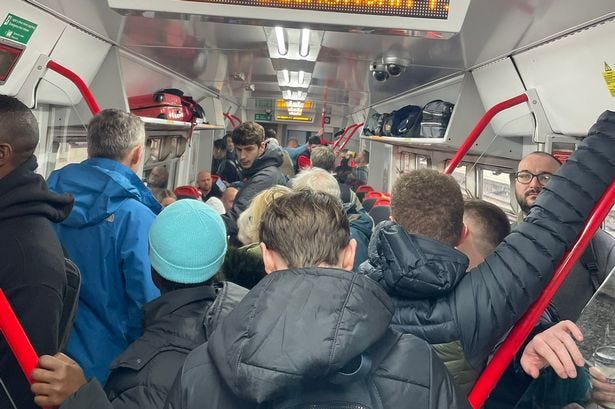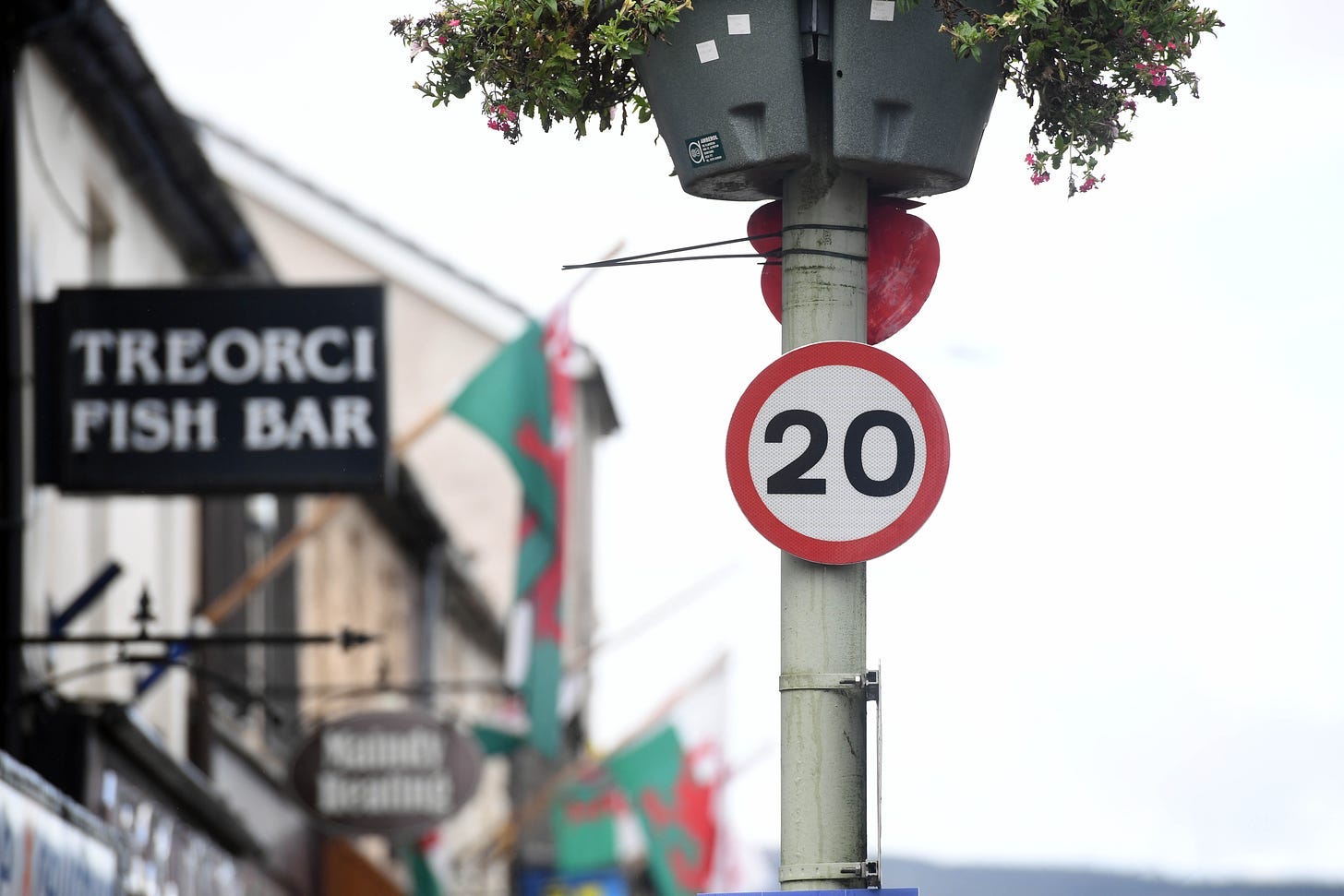Why Wales' trains aren't getting better and what went wrong with the 20mph limit...
Plus new exclusive polling for Wales
At a time when people crave escapism more than ever I am eternally grateful to you for choosing to have me drop into your inbox on a regular basis.
The uptake of this newsletter has blown me away. I never expected this level of subscribers early on so thanks very much - especially to those of you who have paid for a subscription. It really does help me write more of this kind of journalism.
This week, instead of a deep-dive into one topic, I am going to talk about a range of different issues that have come up over the last week. My inspiration for this move came from this Professor Brian Cox tweet:
So in the interest of us all becoming a group of polymaths who won’t stick a hairdryer up their nose to try and cure Covid, let's get into it. We are looking at three issues in this email:
Exclusive polling for Wales (revealed first in this newsletter);
An investigation I have been undertaking into how the UK Government is planning to shaft Wales over rail funding;
An explanation into exactly what went wrong for the Welsh Government with the 20mph limit introduction.
Polling
In the last newsletter we talked about how much pressure the Welsh NHS was under from both the UK Government, who are underfunding the Welsh budget, and the Welsh Government, who are allocating money to other departments and mismanaging it.
But what do the public want to be done to fix it and would they be willing to accept higher taxes to do so? To try and answer this a poll was conducted by the polling company Redfield and Wilton Strategies for WalesOnline. What they found was interesting…
I don’t want to subject you to “death-by-chart” so I have made them different colours to keep your polymath brain stimulated. There are five key graphs that I think we can draw conclusions from.
First up we have the quality of care that people in Wales feel they receive from the Welsh NHS. 75% of people in Cymru think that the quality of care in the Welsh NHS is moderate or better. As a journalist who covers health regularly and as someone who is perpetually using the health service either because of allergies or because I’m bad at sport, this rings true. When there is an acute or emergency situation the health service is great. The people are there because they care (why else would you put yourself in those conditions?) and they know their stuff. It is getting in front of the right person in a timely manner that is the problem.
Things get harder to interpret when we come to who provides the cash for the health service.
What the orange chart tells us is harder to interpret. One thing that is heartening is that only a quarter of people ticked “don’t know”. Now this may seem like a lot of people who don’t know a fairly fundamental element of how their country works, but I really expected this to be a lot higher.
It is hard to say what the” right answer” from the remaining three options was and this is probably because you can make an argument for all three. The Welsh Government does ultimately decide how much money is spent on health from the Welsh budget in Wales. They could decide to not fund it at all if they wanted. But the size of that Welsh budget (of which health is part) is overwhelmingly dictated by what the UK Government spends in England.
Of course, some of the people choosing “UK Parliament” are probably not following a nuanced thought process about budgets. More likely they simply have no idea what the Welsh Government actually does and assume when Chancellor Jeremy Hunt says “the NHS” he is talking about Wales.
So if the Welsh Government wants to increase funding for the Welsh NHS they have to cut something. This brings us onto our next chart…
If you want to increase NHS spending in Wales in any meaningful way you have to cut something else. There is no getting around that. Unlike the UK Government that can just borrow more, the Welsh Government can’t really do that (though it can a tiny bit for capital investment, like buildings).
A significant amount of people in Wales support cutting other areas but this is quite an easy statement when we speak in generalities. When we start asking what we should cut it gets harder. Not only because you have to decide what you cut (are we really taking money out of schools and housing?) but also because of how much you would have to do it to make any real difference in the health service.
Just over half of the Welsh budget is spent on health and social services and the majority of this goes directly to fund the NHS. To see a big percentage increase in NHS funding you would have to be pretty brutal with other budgets. Who would be a politician, right?
But there is another way: the Welsh Government could use its long neglected tax-raising power. Though the UK Government sets the rate of income tax, the Welsh Government has free range on setting rates over its devolved slice of income tax – so the Welsh tax on each income band could be eliminated entirely (i.e. cut by 10p) or raised without (theoretical) limit.
Surprisingly, there is some public support for this:
People are not however as keen to part with a lot of money as you can see from the green graph:
But this is unsurprising. Not only because we are in a cost of living crisis but also because Wales simply doesn’t have many people paying a high rate of tax anyway.
Using Welsh Government estimates from the last financial year (for 2023-24) we can say that:
For every 1p they add to the basic rate of income tax, Wales will receive an extra £220m.
For every 1p they add to the higher rate of income tax, Wales will receive an extra £33m.
For every 1p they add to the additional rate of income tax, Wales will receive an extra £5m
So let’s sum up.
Most people can see that the Welsh NHS needs more money.
Only the UK Government has the ability to really increase the amount of money Wales gets.
If the Welsh Government wants to increase spending without more money from London they either have to brutally cut other areas or raise income tax on Wales’ poorest.
This is a really hard circle to square and you are left with the bitter realisation that this isn’t going to be fixed anytime soon.
On that happy note, let’s take a look at how Wales is getting shafted over rail funding!
Welsh trains - forever in second class
Have you ever tried to get from south Wales to Manchester or north Wales by train? Have you felt the rage that comes from paying huge amounts to be crammed into two slow moving carriages while having nothing to do but literally try to avoid swallowing the hair of the person next to you who is so close you can almost work out what they had for lunch yesterday?
All this because you have the audacity to want to travel in an environmentally friendly way from Llandudno to Abergavenny. Let’s not even get into the fact that to get from Aberystwyth to Cardiff you need to go via England.
The relentless underfunding of Wales’ railways is a massive topic and is going to be a deep dive in a future newsletter. Today I just want to focus on one area where Rishi Sunak has promised the world but is already poised to fail.
In early October, the Prime Minister made a big promise to the people of Wales regarding their railways.
He announced that he would be spending £1bn to electrify the North Wales Mainline. This would undoubtedly have a big positive impact on the lived experience of people travelling in the north of Cymru. This was on top of dozens of other projects in England.
Secretary of State for Wales David TC Davies hailed the decision, saying:
“Today’s announcement will unlock north Wales’ unique potential by transforming its economy and infrastructure. For too long the people of north Wales have been ignored by an incompetent Labour Welsh Government in Cardiff Bay – but the UK Government is correcting that wrong. Under the Conservatives, north Wales is being given the attention it rightly deserves.”
Great sentiments but, alas, total bollocks when you get into the details.
Pretty quickly after the announcement the PM’s promises regarding the other projects started to fall apart. Number 10 said that these weren’t actually commitments, they were examples of what could be done.
So I put in a Freedom of Information request to see if there had been any costing for how much the line would really cost to build (£1bn is very low given recent inflation). I put in a request to National Rail asking:
“Could I please request any estimates for the cost of electrifying the North Wales Coast Mainline dating back to 2011”
Their response was:
“The only estimated costs of electrifying the North Wales Coast mainline we hold were developed in 2015 and were very high level, so are now quite out of date. The costs at this time were estimated at between £232,180,000 - £293,280,000.”
Right. So this shows that this isn’t a grand vision for north Wales that the UK Government has planned. It is a back of a fag packet plan that they realistically have no commitment to deliver because they haven’t even worked out the cost. It was thrown out cynically just so the PM could have something for Wales in his speech.
Better infrastructure is absolutely vital for improving Wales’ issues around the economy and poverty. The way we are treated as an afterthought by the only people who have the ability to improve things is appalling.
The lessons from the 20mph limit
When you are a digital journalist, you get a sixth sense for stories that are going to bring in loads of readers. You just know that certain topics will get people clicking.
Some are a bit surprising, such as our readers' love of Carol Vorderman or almost anything involving The Chase (seriously the Welsh public's appetite for anything involving that show is quite staggering).
After a while you instinctively know what will drive readers. However, there are sometimes stories which totally blindside you with how interested people are in them. For me this has been the 20mph speed limit.
I genuinely had no idea how much people would care about this. On reflection this was dumb. It had all the hallmarks of a politics story which will do well for several reasons:
1. There were visible signs of its implementation.
Many politics stories pass the public by because they are not able to physically see their effects (at least not immediately). This is why the smoking ban in pubs and the 5p carrier bag charge received disproportionately so much more attention than the huge cuts to public services a decade ago. This is not to say that people weren’t aware there would be cuts, just that it is easier to get riled up when you know that tomorrow you can’t smoke in your local than it is about the notion that at some vague point in the future your road might have more potholes or your operation may be cancelled. The 20mph limit has created visible changes in people’s communities even before it came in, it naturally engages people.
2. People bloody hate being told what to do.
Any policy where people are being told they can’t do something has always got attention. Remember when we were told that we couldn’t buy non-essential goods during lockdown?
3. It has been a drawn-out process.
There have been rumblings of a 20mph limit for Wales since 2018. It was in Labour’s 2021 manifesto and has been talked about for the last couple of years. When a policy runs and runs it is like a fire being given continuous oxygen. It burns more and more. The longer a policy is in the public consciousness the more likely it is to catch fire. Even controversial policies can burn out very rapidly if their implementation is quick, like a firework going off: initially very hot but then you are onto the next thing.
In my defence, back in late 2021 this policy was missing a key element that most ideas that truly catch fire in the public's imagination need: someone to fan the flames. Labour obviously supported it (it was their policy), Plaid did and the Tories had actually called for the measures themselves. But then the Tories realised that this could be a vote winner, and shifted from voting for the policy to vehement opposition and now we have a really contentious issue.
There are lessons to be learnt from this. The first is that the Welsh Government needs to be far, far, far better at communicating why it is doing the things it is doing.
Cards on the table, I personally believe that the 20mph limit is a pretty decent piece of policymaking. With 20,000 fewer casualties on Wales’ roads over the next decade it is, to me, a no-brainer. You can read why I like the policy here.
It doesn’t mean there aren’t negatives, there are with every policy, it just means that on balance this will be a net positive for Wales. That isn’t just me saying this, there are loads of studies and international comparisons.
But Welsh Government politicians are not good at illustrating these beyond sending a few tweets and press releases. There is a lot they do which is questionable but here the evidence is really on their side. But they have allowed political opponents to seize the narrative and now are playing catch-up.
Political leadership isn’t about putting forward the right policy and allowing its merits to speak for itself. It is about convincing and making a case to bring people along with you. To be fair, some of the ministers have put their head above the parapet because they believe in what they are doing, but there hasn’t been a good enough co-ordinated campaign to seize the initiative and hold it.
Thanks so much for reading this week's newsletter. Please do share with people you think will be interested - it really helps me out. Any feedback please do leave in the comments and let me know if there is anything in particular you want covered.
Take care, fellow polymaths!
Will












Hi Will, the 20mph has obviously been poorly communicated and implemented, but I’ve also been surprised by the scale of negativity against it. Then I noticed a post on a local Facebook hub with a picture of inferring local tailbacks caused by 20mph, the picture wasn’t local. So I checked the ‘local’ person who posted it. He wasn’t local and he’d posted exactly the same picture and message on hubs all across Wales. His account with the exception of 1 post and only been used for anti 20mph messages. I reported all of the posts and any subsequent posts to the hub administrators and had them removed. My point is Facebook has been heavily used to drive anti 20mph sentiment, get signatures on the petition and spread misinformation . Have you looked at who is behind driving, what is a very successful Facebook campaign against 20mph, my feeling is they’re also aligned with anti - devolution and of course anti - independence?